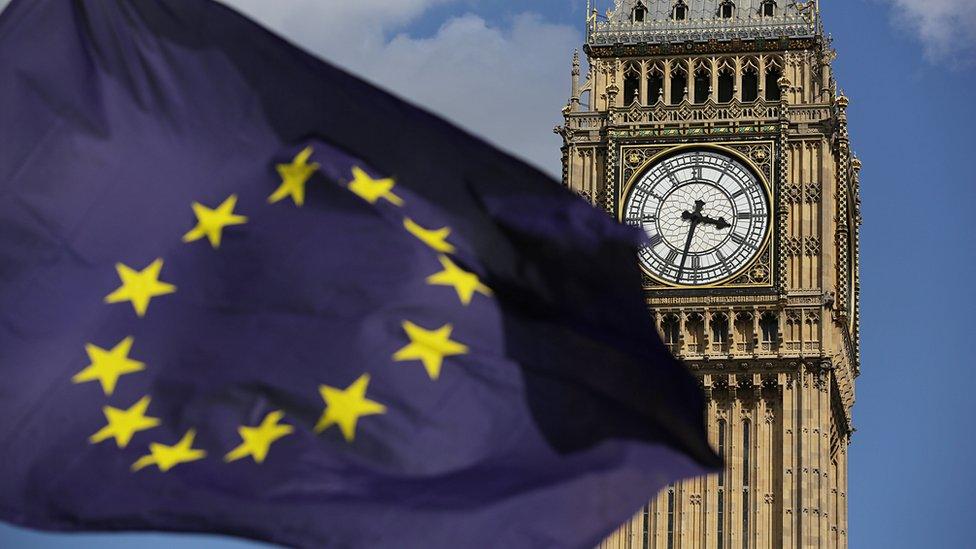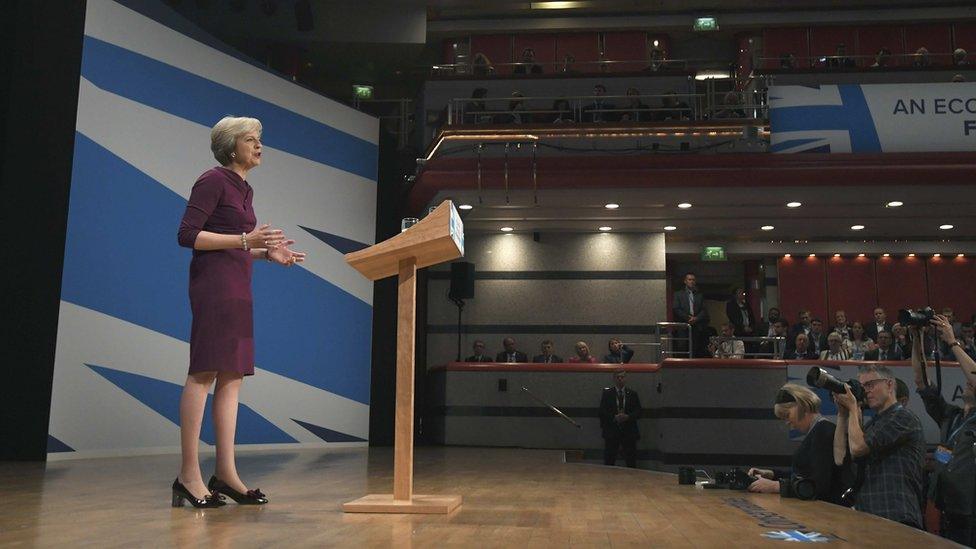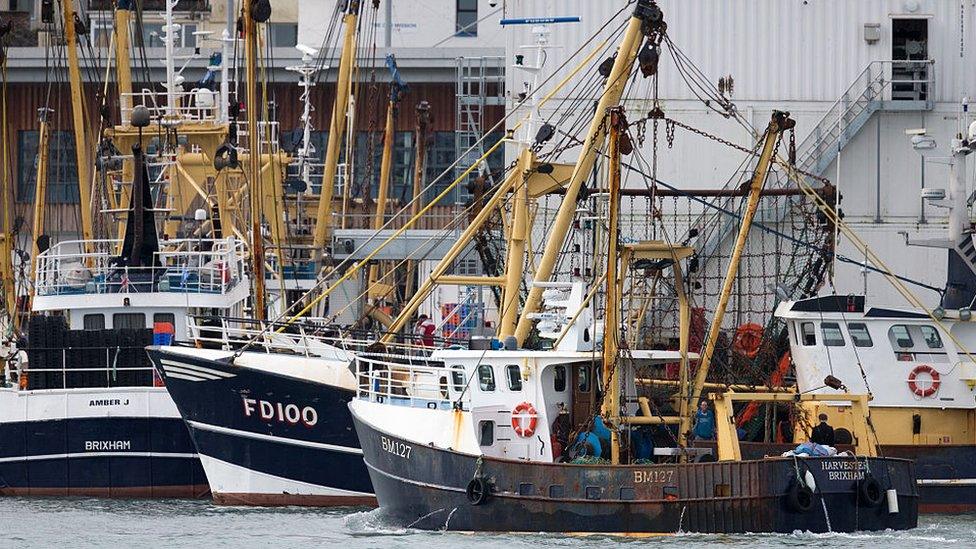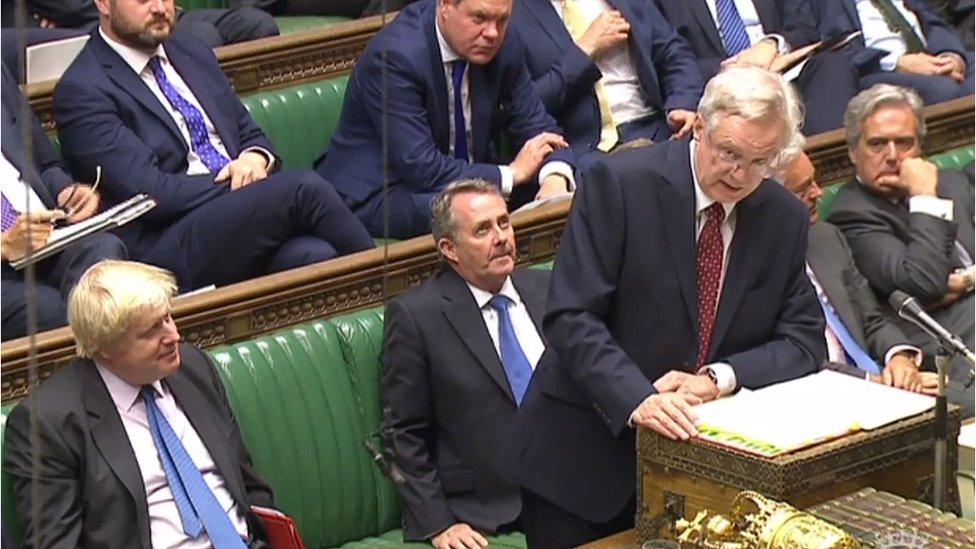Theresa May's parliamentary pickle
- Published

How and when will the prime minister tell Parliament the government's strategy for leaving the European Union?
The players focus intently on their cards, holding them close to their chests as the betting gets tenser, the stakes higher.
Suddenly a small voice pipes up.
"Mummy, two sevens are really good, aren't they, Mummy? You're going to win, aren't you, Mummy?"
Mummy throws down her pathetic single pair, the paucity of her position stripped bare. Even if the kids had blurted out that there was a royal flush in hand, the stratagem would have been ruined.
You can well understand why Mrs May does not want to let MPs peek at her Brexit hand, let alone dictate what it is, external.
She wouldn't be sent, like Nye Bevan, naked into the conference chamber, external but with detailed White Papers strategically protecting her modesty, yet revealing all.
It's pretty obvious that if the other 27 EU countries know her instructions from Parliament they would be at a significant advantage.
But you can also understand why MPs don't like being treated like irritating small children, spoiling the grown-ups' game, poking their noses in where they are not wanted.
They think their views matter., external But "the running commentary" argument is not the least of it. Much more important is the apparent plan to avoid a vote, any vote.
It has been decided the referendum is a trump card., external The government gives the impression that people have voted and further voting is not only superfluous, but potentially a dangerous flouting of the general will., external
It is unlikely this will hold.

The prime minister says that the government will not give a "running commentary" on the Brexit process
Indeed, it won't, because the government has announced that there will be a vote on the Great Repeal Bill., external Whatever their reluctance, it is hard to see how MPs wouldn't be given a say on the final deal.
But Mrs May's fear of holding loads of votes on Brexit make sound political sense.
Consider what it might mean if she lost. She has a very narrow majority and the risk is a real one. But what would losing mean? That she had to rethink her strategy in the middle of negotiations? That, after a triumphant return from Brussels, she had to go back again and try harder?
How would she interpret such a vote? A rejection of parts of the deal or the spirit behind it? A vote about the very essence of Brexit itself, or on a particular problematic paragraph about fish? Or would it amount to a vote of no confidence and force a general election?
So it makes good sense to deny MPs the chance to humiliate the government whenever possible.
But the trouble with continually dodging and ducking parliamentary votes is the smell.
For years, those who wanted the UK to leave the European Union trumpeted the inviolable glory of parliamentary sovereignty, external.
They fulminated against politicians going off to Brussels and doing secret deals behind closed doors, politicians who wouldn't even ask MPs to vote on the agreements they made out of sight and away from scrutiny.

Could a Commons vote on a Brexit deal rest on a paragraph concerning the fishing industry?
Now, for very understandable reasons, they want to go off to Brussels and do a secret deal behind closed doors and then not allow Parliament to have a say on the result.
It may be good politics, but only the signed-up cheerleaders will politely ignore the whiff of hypocrisy.
Of course, we have heard the reason that MPs shouldn't be allowed to have their say. The people have already spoken, and their will cannot, must not, will not, be thwarted. The new government may genuinely fear that the old establishment might yet get its way - and they will be left getting the blame for betrayal.
But there's a deeper politics at play, about authority and anxiety.
Behind Mrs May's brisk self-confidence there must be an awareness that she is not there because of a vote by MPs or a general election. She came to power, almost by accident, because of the referendum. So she has taken it as her mandate, the source of her authority.
The prime minister has moved from her enigmatic, almost mystical, "Brexit means Brexit" phase to a more doctrinal interpretation of the vote of 23 June.
She has said the British people voted, external against unrestricted immigration, an unresponsive democracy, elites, inequality, the banks, unfairness and liberal views on crime - and for job security, patriotism and government intervention in the economy.
She hasn't quite told us that the British people were voting on how to pronounce "scones" and the best way to get to Woking, but it may not be long.
As it happens, I think she is correct in her guesses about what lay behind the vote.

David Davis, Secretary of State for Exiting the European Union, has said: "If a democracy cannot change its mind, it ceases to be a democracy"
But she has placed herself in the role of High Priestess of Brexit, alone able to divine its deep meaning, jealously protecting the holy aura of the oracle.
It is why any reporting of possible negative effects of the decision must be treated as a combination of lese majeste and an unpatriotic stab in the back by bad losers,, external not as the way a grown-up media in a grown-up democracy works.
The referendum is a deep well of authority, but not a bottomless one. There are clear dangers in treating it like a magic sack.
As David Davis once observed: "If a democracy cannot change its mind, it ceases to be a democracy.", external
MPs are very jealous of their own authority and are likely to continue being bothersome until they are allowed to vote.
One could debate the political philosophy of this endlessly.
But, before long, Mrs May might give in to the practical politics. Granting some votes would be both messy and risky, but perhaps better than backbenchers constantly grumbling that they are playing second fiddle to the overwhelming moral force of a plebiscite.
- Published30 December 2020

- Published10 October 2016
- Published12 October 2016
